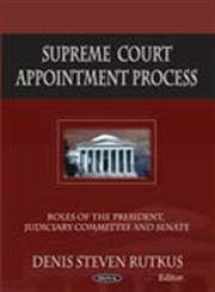
Supreme Court Appointment Process
ISBN-13:
9781594547119
ISBN-10:
1594547114
Author:
Denis Steven Rutkus
Publication date:
2016
Publisher:
Nova Science Pub Inc
Format:
Paperback
74 pages
FREE US shipping
Book details
ISBN-13:
9781594547119
ISBN-10:
1594547114
Author:
Denis Steven Rutkus
Publication date:
2016
Publisher:
Nova Science Pub Inc
Format:
Paperback
74 pages
Summary
Supreme Court Appointment Process (ISBN-13: 9781594547119 and ISBN-10: 1594547114), written by authors
Denis Steven Rutkus, was published by Nova Science Pub Inc in 2016.
With an overall rating of 4.1 stars, it's a notable title among other
books. You can easily purchase or rent Supreme Court Appointment Process (Paperback) from BooksRun,
along with many other new and used
books
and textbooks.
And, if you're looking to sell your copy, our current buyback offer is $0.43.
Description
The appointment of a Supreme Court Justice is an infrequent event of major significance in American politics. Each appointment is important because of the enormous judicial power the Supreme Court exercises as the highest appellate court in the federal judiciary. Appointments are infrequent, as a vacancy on the nine member Court may occur only once or twice, or never at all, during a particular President's years in office. Under the Constitution, Justices on the Supreme Court receive lifetime appointments. Such job security in the government has been conferred solely on judges and, by constitutional design, helps insure the Court's independence from the President and Congress. The procedure for appointing a Justice is provided for by the Constitution in only a few words. The Appointments Clause (Article II, Section 2, clause 2) states that the President shall nominate, and by and with the Advice and Consent of the Senate, shall appoint ...Judges of the Supreme Court. but its most basic feature - the sharing of power between the President and Senate - has remained unchanged: to receive lifetime appointment to the Court, a candidate must first be nominated by the President and then confirmed by the Senate. Although not mentioned in the Constitution, an important role is played midway in the process (after the President selects, but before the Senate considers) by the Senate Judiciary Committee. On rare occasions, Presidents also have made Court appointments without the Senate's consent, when the Senate was in recess. Such recess appointments, however, were temporary, with their terms expiring at the end of the Senate's next session. The last recess appointments to the Court, made in the 1950s, were controversial, because they bypassed the Senate and its advice and consent role. The appointment of a Justice might or might not proceed smoothly. Since the appointment of the first Justices in 1789, the Senate has confirmed 120 Supreme Court nominations out of 154 received. votes, while nearly all of the rest, in the face of committee or Senate opposition to the nominee or the President, were withdrawn by the President or were postponed, tabled, or never voted on by the Senate. Over more than two centuries, a recurring theme in the Supreme Court appointment process has been the assumed need for excellence in a nominee. However, politics also has played an important role in Supreme Court appointments. The political nature of the appointment process becomes especially apparent when a President submits a nominee with controversial views, there are sharp partisan or ideological differences between the President and the Senate, or the outcome of important constitutional issues before the Court is seen to be at stake.


We would LOVE it if you could help us and other readers by reviewing the book
Book review

Congratulations! We have received your book review.
{user}
{createdAt}
by {truncated_author}


